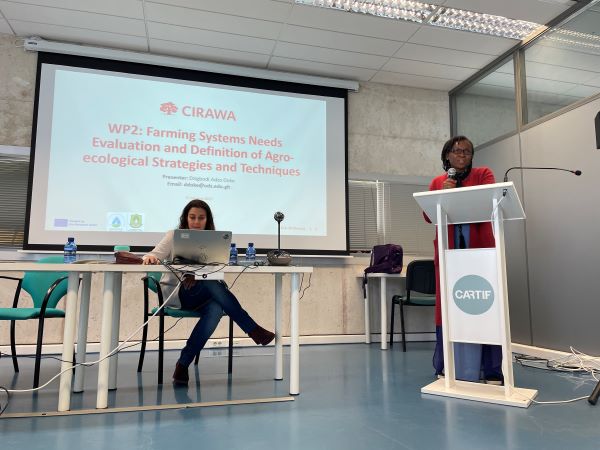”We seem to have forgotten why food is being produced” stressed Saa Dittoh – Adjunct Professor of Food Systems at WACWISA – in a meeting that kicked off the CIRAWA project in Valladolid, Spain, on 25-26 January. This sentiment highlighted the overall tone of the meeting, emphasising food security and putting people in the centre of the project.
Funded by the European Union, CIRAWA brings together 14 partners from 9 countries in Europe and Africa, led by CARTIF Technology Centre, to develop innovative agroecological strategies to build climate resilience in West Africa .
The future of agriculture
Despite the EU Green Deal advocating for a forward-looking agricultural sector, “the kind of production that we have now doesn’t take the future into consideration” went on to explain Prof. Dittoh. The Intergovernmental Panel on Climate Change (IPCC) estimates that crop growing periods in West Africa may shorten by an average of 20% by 2050, causing a 40% decline in cereal yields and a reduction in cereal biomass for livestock. With the region highly dependent on small-holder agriculture, the threat to livelihoods and lives posed by climate change must be addressed.
Agroecological solutions for climate resilience
Agroecological farming is emerging as a compelling response to the challenges West Africa faces. It is a scientifically validated alternative to conventional farming that has the potential to transform food systems, making them more sustainable whilst meeting the growing demand for food, contributing to landscape quality, and enhancing biodiversity and climate resilience.
The CIRAWA project was developed to work with small-holder farmers in the region to improve the nutritional value of food and ecosystem health, whilst addressing the negative impacts of both climate change and conventional agricultural practices. The project is developing new agroecological-based practices that build on existing local and scientific knowledge and will help to improve the resilience of food supply chains in 8 regions across Cape Verde, Ghana, Senegal, and The Gambia.
Working with farmers to unlock nature’s benefits
The proposed strategies will support farmers to manage land, soil, water, and nutrients in more efficient and sustainable ways, emulating nature to unlock ecosystem service benefits. They will provide tools for farmers to gain access to competitive markets and increase income generation activities, invigorating local economies, with a focus on engaging women and youth.
CIRAWA will work in close collaboration with farmers to gain a good understanding of their needs and limitations. Prof. Dittoh emphasised that “The bottom line for farmers was whether agroecological solutions will be economically viable”. Solutions will therefore have to not only be adapted to the specific region characteristics and ecosystem needs but must be economically viable for farmers to adopt them.
The project will work with more than one thousand farmers and local stakeholders from across the case study regions, requiring a concerted effort from project partners on the ground to ensure cultural and linguistic differences are respectfully addressed to foster deeper engagement with the proposed strategies.
Creating an enabling environment
To facilitate the uptake of agroecological solutions, CIRAWA is working with various stakeholder groups and is appointing key stakeholders as members of an advisory board to provide ongoing input on the project’s activities and results. Through this board, CIRAWA will draw from a diverse pool of perspectives on how to best guarantee that project results and strategies have real world impact. By engaging target stakeholders from policy and government administrations to researchers and representatives from the agri-food sector, CIRAWA is uncovering and tackling barriers to the development of agroecological farming and novel bio- based and circular markets.








